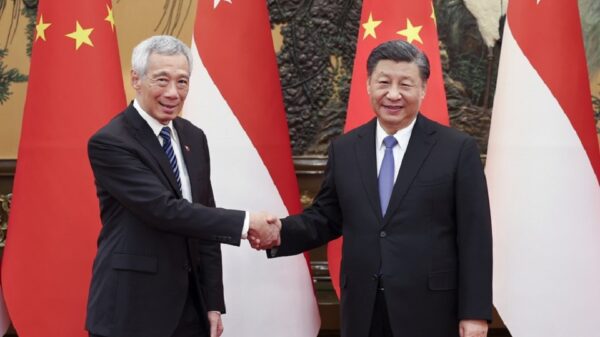
China and Singapore have agreed to upgrade bilateral relations to an “All-Round High-Quality Future-Oriented Partnership”, reflecting both countries’ desire to set the strategic direction and chart the development of bilateral relations going forward.
At the invitation of Li Qiang, Premier of the State Council of the People’s Republic of China, Prime Minister of the Republic of Singapore Lee Hsien Loong made an official visit to China from March 27 to April 1, 2023.During the visit, Xi Jinping, President of the People’s Republic of China, met with the prime minister of Singapore.
Chinese Premier Li Qiang and Singapore PM Lee held a bilateral meeting. Prime Minister Lee also met with Zhao Leji, Chairman of the Standing Committee of the National People’s Congress, and Wang Huning, Chairman of the National Committee of the Chinese People’s Political Consultative Conference.
A joint announcement was released today by China and Singapore on the establishment of the all-round high-quality future-oriented partnership.
Singapore reaffirmed its support for China’s pursuit of high-quality development and welcomed China’s continued commitment to reform and opening up.
China spoke highly of Singapore’s longstanding participation in China’s modernisation journey, which has laid a strong foundation for bilateral cooperation, and expressed support for Singapore’s continued growth and prosperity.
Both sides took stock of the commendable progress of bilateral cooperation on the Belt and Road Initiative (BRI). On the important occasion of the tenth anniversary of the BRI this year, both countries will take the opportunity to broaden and deepen high-quality cooperation that benefits our peoples and region.In line with the two countries’ commitment towards collaboration that is of a high standard and quality, both sides welcomed the substantive conclusion of the China-Singapore Free Trade Agreement (CSFTA) Work Programme for Subsequent Negotiations, which was launched pursuant to the Protocol to Upgrade the CSFTA signed in 2018.
This upgrade will allow the CSFTA to provide for more business-friendly, liberal, and transparent rules as well as improve the market access for our businesses to trade and invest in each other’s markets. Both sides looked forward to the signing of the Protocol for the CSFTA Subsequent Negotiations as soon as possible this year.
Building on the “High-Quality” and “Future-Oriented” approach to bilateral cooperation, both sides looked forward to strengthening the comprehensive and innovative cooperation between China and Singapore in areas including trade and investment, green and digital economies, food security, financial sector, aviation, and people-to-people exchanges.
Both countries will work together to harness synergies in new fields like digital transformation and unlock new growth opportunities geared to the future development. Both sides looked forward to pursuing new areas of cooperation, making full use of intergovernmental mechanisms such as the existing annual Joint Council for Bilateral Cooperation, as well as the eight Provincial Business Councils in China.
China and Singapore reaffirmed the continued strengthening of ASEAN-China relations and cooperation under the ASEAN-China Comprehensive Strategic Partnership. Singapore welcomed China’s support for the importance of maintaining ASEAN centrality in the evolving regional architecture.
China and Singapore will work together for the effective implementation of the Regional Comprehensive Economic Partnership Agreement (RCEP), and advance preparations for the further enhancement of the ASEAN-China Free Trade Area (ACFTA 3.0) to drive mutually beneficial economic growth.
They reaffirmed their shared commitment to multilateralism, support for the purposes and principles of the United Nations Charter, adherence to international law, and would continue to maintain close communication and cooperation at the United Nations and other multilateral organisations.
China and Singapore will continue to work together to uphold the rules-based multilateral trading system as embodied by the World Trade Organisation (WTO), maintain an open and inclusive global economy, and ensure the stable and smooth operation of global supply chains, so as to jointly meet global challenges and make economic globalisation more open, inclusive, balanced and beneficial to all.